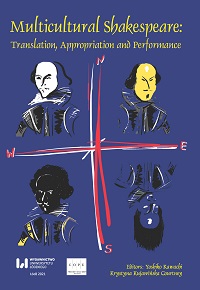The Myth of Total Shakespeare: Filmic Adaptation and Posthuman Collaboration
DOI:
https://doi.org/10.18778/2083-8530.24.04Słowa kluczowe:
André Bazin, Posthumanism, Cinema 3.0, Shakespeare, Database Cinema, Gender, Florence Pugh, Object Oriented Ontology, Reality, Post-Cinema, Post- Shakespeare, CollaborationAbstrakt
The convergence of textuality and multimedia in the twenty-first century signals a profound shift in early modern scholarship as Shakespeare’s text is no longer separable from the diffuse presence of Shakespeare on film. Such transformative abstractions of Shakespearean linearity materialize throughout the perpetual remediations of Shakespeare on screen, and the theoretical frameworks of posthumanism, I argue, afford us the lens necessary to examine the interplay between film and text. Elaborating on André Bazin’s germinal essay “The Myth of Total Cinema,” which asserts that the original goal of film was to create “a total and complete representation of reality,” this article substantiates the posthuman potentiality of film to affect both humanity and textuality, and the tangible effects of such an encompassing cinema evince themselves across a myriad of Shakespearean appropriations in the twenty-first century (20). I propose that the textual discourses surrounding Shakespeare’s life and works are reconstructed through posthuman interventions in the cinematic representation of Shakespeare and his contemporaries. Couched in both film theory and cybernetics, the surfacing of posthuman interventions in Shakespearean appropriation urges the reconsideration of what it means to engage with Shakespeare on film and television. Challenging the notion of a static, new historicist reading of Shakespeare on screen, the introduction of posthumanist theory forces us to recognize the alternative ontologies shaping Shakespearean appropriation. Thus, the filmic representation of Shakespeare, in its mimetic and portentous embodiment, emerges as a tertiary actant alongside humanity and textuality as a form of posthuman collaboration.
Pobrania
Bibliografia
Anonymous. Dir. Roland Emmerich. Film. Columbia Pictures, 2011.
Google Scholar
Bazin, André. “The Myth of Total Cinema.” What Is Cinema? Volume I. Trans. Hugh Gray. Berkley, California: University of California Press, 2004. 17-22.
Google Scholar
Bazin, André. “The Ontology of the Photographic Image.” What Is Cinema? Volume I. Trans. Hugh Gray. Berkley, California: University of California Press, 2004. 9-16.
Google Scholar
Braidotti, Rosi and Maria Hlavajova. “Introduction.” Posthuman Glossary. Eds. Rosi Braidotti and Maria Hlavajova. London: Bloomsbury, 2018. 1-14.
Google Scholar
Daly, Kristen. “Cinema 3.0: The Interactive-Image.” Cinema Journal 50.1 (2010): 81-98.
Google Scholar
Denson, Shane and Julia Leyda. “Perspectives on Post-Cinema: An Introduction.” Post-Cinema: Theorizing 21st-Century Film. Eds. Shane Denson and Julia Leyda. Falmer: Reframe Books, 2016. 1-19 https://doi.org/10.1002/nsr.30210.
Google Scholar
DOI: https://doi.org/10.1002/nsr.30210
Desmet, Christy. “Alien Shakespeares 2.0.” Actes des congrès de la Société française Shakespeare 35 (2017): 1-19.
Google Scholar
DOI: https://doi.org/10.4000/shakespeare.3877
Ebiri, Bilge. “Jim Jarmusch on Only Lovers Left Alive, Vampires, and the Shakespeare Conspiracy.” Vulture. 11 April 2014 https://www.vulture.com/2014/04/jimjarmusch-only-lovers-left-alive-interview.html Accessed 12 July 2021.
Google Scholar
Fienberg, Daniel. “‘King Lear’: TV Review.” The Hollywood Reporter. 19 September 2018 https://www.hollywoodreporter.com/tv/tv-reviews/king-lear-review-amazon-1143459/ Accessed 2 July 2021.
Google Scholar
Hassan, Ihab. “Prometheus as Performer: Towards a Posthumanist Culture?” The Georgia Review 31.4 (1977): 830-850 https://doi.org/10.1063/1.89573
Google Scholar
DOI: https://doi.org/10.1063/1.89573
Hayles, N. Katherine. How We Think: Digital Media and Contemporary Technogenesis. Chicago: University of Chicago Press, 2012.
Google Scholar
DOI: https://doi.org/10.7208/chicago/9780226321370.001.0001
Herbrechter, Stefan. “Genealogy.” Critical Posthumanism. 27 February 2020 https://criticalposthumanism.net/genealogy-entry/ Accessed 18 June 2021.
Google Scholar
Hopkins, D.J., Catherine Ingram, and Bryan Reynolds. “Nudge, Nudge, Wink, Wink, Know What I Mean, Know What I Mean? A Theoretical Approach to Performance for a Post-Cinema Shakespeare.” Performing Transversally: Reimagining Shakespeare and the Critical Future. Ed. Bryan Reynolds. New York: Palgrave Macmillan, 2003. 137-170.
Google Scholar
DOI: https://doi.org/10.1007/978-1-137-10764-0_6
Kracauer, Siegfried. Theory of Film: The Redemption of Physical Reality. New York: Oxford University Press, 1960.
Google Scholar
Lanier, Douglas. “Shakespearean Rhizomatics: Adaptation, Ethics, Value.” Shakespeare and the Ethics of Appropriation. Eds. Alexa Huang and Elizabeth Rivlin. New York: Palgrave Macmillan, 2014. 21-40.
Google Scholar
DOI: https://doi.org/10.1057/9781137375773_2
Manovich, Lev. The Language of New Media. Cambridge, Massachusetts: MIT Press, 2002.
Google Scholar
Mills, Charles. “White Ignorance.” Race and Epistemologies of Ignorance. Eds. Shannon Sullivan and Nancy Tuana. New York: State University of New York Press, 2012. 13-38 https://doi.org/10.1007/s15202-012-0073-7
Google Scholar
DOI: https://doi.org/10.1007/s15202-012-0073-7
Only Lovers Left Alive. Dir. Jim Jarmusch. Film. Recorded Pictures Company, 2013.
Google Scholar
Plecháč, Petr. “Relative Contributions of Shakespeare and Fletcher in Henry VIII: An analysis Based on Most Frequent Words and Most Frequent Rhythmic Patterns.” Digital Scholarship in the Humanities (2020): 1-11.
Google Scholar
DOI: https://doi.org/10.1093/llc/fqaa032
Romeo and Juliet. Dir. Renato Castellani. Film. Universalcine, 1954.
Google Scholar
Sawyer, Robert. “Bitcoin, Blockchains, and the Bard.” Variable Objects: Shakespeare and Speculative Appropriation. Valerie M. Fazel and Louise Geddes, Eds. Edinburgh: Edinburgh University Press, 2021. 59-81.
Google Scholar
Sawyer, Robert. Marlowe and Shakespeare: The Critical Rivalry. New York: Palgrave Macmillan, 2017.
Google Scholar
DOI: https://doi.org/10.1057/978-1-349-95227-4
Shakespeare, William. Hamlet. The Norton Shakespeare. Ed. Stephen Greenblatt. 3rd ed. New York: Norton, 2016. 1194-1283.
Google Scholar
Shakespeare, William. King Lear. The Norton Shakespeare. Ed. Stephen Greenblatt. 3rd ed. New York: Norton, 2016. 1384-1460.
Google Scholar
Soloski, Alex. “Review: Living the ‘Dream,’ on Your Laptop or Phone.” The New York Times. (17 March 2021). Online at https://www.nytimes.com/2021/03/17/theater/review-dream-royal-shakespeare-company.html
Google Scholar
Pobrania
Opublikowane
Jak cytować
Numer
Dział
Licencja

Utwór dostępny jest na licencji Creative Commons Uznanie autorstwa – Użycie niekomercyjne – Bez utworów zależnych 4.0 Międzynarodowe.












